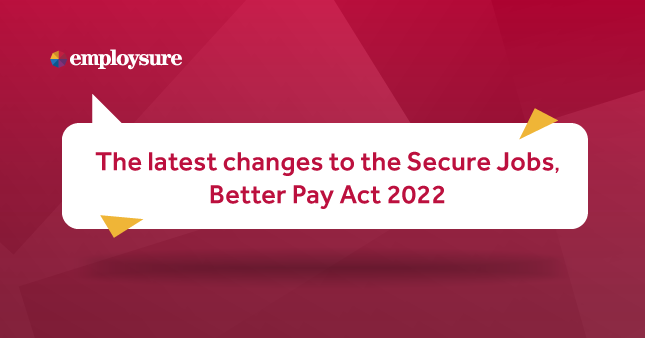
Fair Work Ombudsman
You may have read about Fair Work Ombudsman, or heard the term in the news. In recent years, many Australian companies have come under the scrutiny of the Fair Work Ombudsman, so it is something that employers in all industries should know about.
What Is the Fair Work Ombudsman?
Fair Work Ombudsman (the Ombudsman) is an Australian government agency responsible for ensuring businesses, business owners and employers comply with their related employment obligations. Some of these obligations include the application of Modern Award and Enterprise Agreements, as well as rates of pay. If you are an employer and are unsure of your Fair Work obligations, the Ombudsman are available to give advice where necessary, but they also serve to resolve issues with employment obligations, as well as entitlements and leave.
While the Ombudsman may appear to some employers as an active agent designed to enforce Fair Work legislation, they also serve a very helpful purpose. By providing advice and education to businesses and employers in general, the Australian work environment is made a much more efficient and comfortable place for all involved. They also ensure that any misunderstandings or confusions with Fair Work are resolved before they become problematic. For instance, employers and employees can contact the Fair Work Ombudsman for advice on understanding the terms associated with the applicable Modern Award for their industry or role. Alternatively, there is also the opportunity to check and clarify entitlements within an Enterprise Agreement such as pay rates and holidays.
What Do The Fair Work Commission And Fair Work Ombudsman Do?
The Fair Work Commission (FWC) is the independent national workplace relations tribunal. It is responsible for maintaining a safety net of minimum wages and employment conditions, as well as a range of other workplace functions and regulations.
What it can do
Help employees and employers bargain in good faith and to make, vary or terminate enterprise agreements
Deal with applications relating to ending employment including unfair dismissal, unlawful termination or general protections
Deal with applications for an order to stop bullying at work
Make orders about industrial action, including strikes, work bans and lock outs
Provide mediation, conciliation and in some cases hold public tribunal hearings to resolve various individual and collective workplace disputes
Make workplace determinations, hear and decide on equal remuneration claims, and deal with applications about transfer of business, stand down, general protections and right of entry disputes.
What it can’t do
Provide advice on entitlements under an award or registered agreements
Enforce minimum pay and award entitlements
Similar to the FWC, the Fair Work Ombudsman (FWO) works to ensure the correct understanding and implementation of the Fair Work Act’s legislation in Australia. However, unlike the FWC’s tribunal-nature, the FWO works to help employees, employers, contractors and the wider workplace community understand their workplace rights and responsibilities, with the key agenda being to keep workplaces fair through education and mediation. All of the FWO’s services are free and rather than operating in an enforcement capacity, they offer information, tools, templates and help for individuals to resolve workplace matters without the need for intervention.
What they can do
Educate people about fair work practices, rights and obligations
Resolve workplace issues by promoting and monitoring compliance with suspected breaches of workplace laws, awards and registered agreements
Enforce workplace laws and seek penalties for breaches of workplace laws
Enforce certain orders made by the Fair Work Commission.
What they can’t do
Investigate unfair dismissal and unlawful termination applications
Make changes to the legislation, awards or registered agreements
Investigate bullying and harassment complaints.
Resolving Workplace Matters
The ideal scenario for a workplace issue would be to have it resolved prior to any regulatory bodies becoming involved – this would not only save time but also reduce any discomfort between the parties. However, that is not always possible. So if an employee suspects, or is aware of the fact, that they are not receiving the correct entitlements as per Fair Work legislation, the Ombudsman are available to help resolve the issue through processes like mediation. But remember, there is the option to seek advice before a problem arises.
While it may seem like a big deal to have the Ombudsman involved in your employees’ work relations, their emphasis is on early intervention and resolution by providing advice and support. Which means that seeking the advice of the Ombudsman well in advance of any issues arising is the best way to prevent them occurring in the first place.
In some cases though, employers and employees do not seek the advice of the Ombudsman and serious instances of non-compliance can occur. If this happens then Fair Work Ombudsman may investigate any possible breaches of workplace laws. You should know that Ombudsman inspectors have a high level of power when they are conducting investigations. They are permitted access to inspect workplaces, review and copy documentation and records and even interview any person they believe will be able to assist with determining an outcome. For the most part, Ombudsman respond to employee complaints to conduct investigations. For example, if any of your employees have underpayment queries or make complaints about actions and entitlements at the workplace, you will most likely receive a visit from an inspector.
Sometimes Ombudsman inspectors review businesses at random. Hence, you should ensure that you and your employee understand the Fair Work legislation relating to your industry and that you are compliant.
Even though the Ombudsman may receive a lot of complaints, they do not necessarily investigate every single request for assistance. As it is a relatively simple process to put forward a complaint, there needs to be some discretion in deciding which complaints are legitimate and require investigation. The Ombudsman chooses to investigate if the request for assistance is fairly significant or is of public interest.
If your business is facing an investigation, it is in your best interest as the business owner to cooperate with the Ombudsman. You should consent to all their requests and make it as easy as possible for them to conduct the investigation. It may go without saying, but the best remedy for an investigation, and likewise to guarantee you are not investigated in the first place, is to ensure that you have a detailed understanding of your employment obligations and have the correct documents, policies and procedures in place and are offering the correct entitlements to your employees. So before any considerations of whether you may or may not be investigated by the Ombudsman, make sure that you are aware of your requirements under the Fair Work Act 2009. If faced with an investigation, employers should seek professional advice on how to respond.
Employsure helps businesses understand and implement the correct workplace requirements in line with the Fair Work Act. We advise and assist regarding any employment issues that arise or if your business is audited by the Ombudsman. If you would like more information on the Ombudsman or how you can better comply with Fair Work legislation, call us today on 1300 651 415.
Get Workplace Advice Now
Call Our Team of Expert Advisers To Get Help With Any Workplace Related Questions.


